FREE Standard Shipping On All Orders $100 or More!*
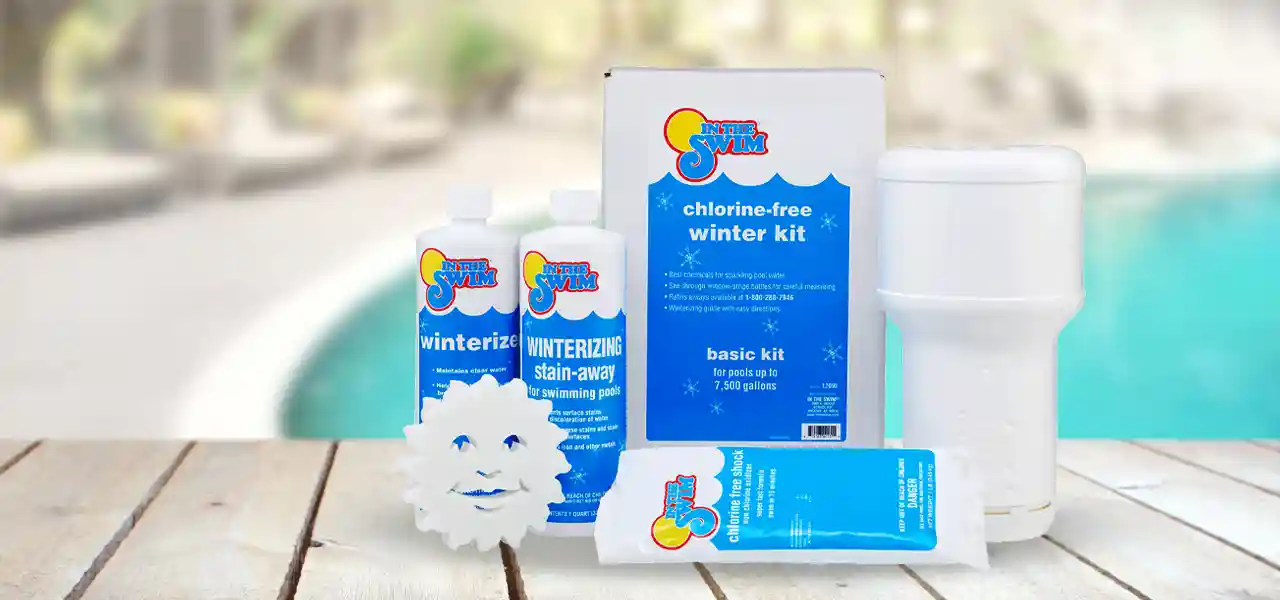
What Chemicals Are Needed to Close a Pool?
Winter will be here soon, and for snowbelt pool owners, thoughts have already turned towards closing up the pool for winter. But what pool closing chemicals and supplies do you need to winterize and close a pool, and do you have enough of them on hand?
Now is the best time to take stock of your pool closing supplies. These include winter chemicals, pool cover attachments, pool plugs, gizzmos, and any other accessories used to close the pool and protect it against winter damage.
Today, we're taking a closer look at the chemicals used for winterizing swimming pools. Used properly, winter chemicals keep the water fresh and clear. They also prevent stains and scale from appearing on pool surfaces through the off-season.
What Pool Closing Chemicals Do You Need?
Aside from your standard water balance chemicals used to adjust pH, Total Alkalinity, or Calcium Hardness, these are the chemicals most commonly used to winterize pools:
- Chlorine-Free Pool Shock: Add 2 days before closing the pool to oxidize contaminants.
- Stain & Scale Treatment: Add 1 day before closing the pool to protect pool surfaces from mineral buildup.
- Winter Algaecide: Pour into the pool just before covering to prevent algae growth.
- Winter Floater or WinterPill: Place into the pool just before covering to give your pool a slow, steady supply of sanitizer.
- Pool Antifreeze: Add to plumbing lines to protect against freeze damage.
It's no coincidence that our Winter Closing Kits contain these exact chemicals, plus a Winter-Sorb to absorb oils floating on the surface. The only other chemical you may need is our non-toxic Pool Antifreeze, used to protect skimmers and pool plumbing against freeze damage.
For even more protection against stains, scale, and algae growth, our Pool Closing Kits come with Natural Chemistry treatments (shown above). Some also come with the WinterPill, recommended for clearer and cleaner spring openings.
FAQ: Pool Closing Chemicals
Understanding the necessary chemicals is crucial for efficiently closing your pool. Essential chemicals include pH balancers, algicides, chlorine shock, and pool antifreeze. Balancing the pH prevents equipment damage, algicides stop algae growth, chlorine shock sanitizes, and pool antifreeze protects pipes from freezing. Following these steps ensures a safe and cost-effective pool closure.
Here are the top nine questions we get about pool closing and winter pool chemicals.
Should I Shock the Pool Before Closing?
Absolutely. Shocking the pool with a granular oxidizer gives your pool water a good start to winter. It removes impurities and contaminants that could stain the pool or consume your winter water chemicals. If shocking with chlorine pool shock, add it 5-7 days before closing the pool, as very high chlorine levels can disrupt or destroy your winter algaecide or stain and scale chemicals. You can add Chlorine-Free Shock just hours before other pool closing chemicals, and it won't damage your winter pool cover.
Do I Need to Use a Winter Pool Algaecide?
Many good algaecides used during the summer may not perform as well as our Winter Algaecide. This type of algaecide "hibernates" until water temperatures rise again next spring. Avoid high doses of copper algaecides, as overuse may lead to staining. Algaecide 60 Plus is a lone exception – the polymer is a good alternate choice to our Winter Algaecide.
Can I Use My Chlorine Floater During Winter?
Stains or burns can come from a chlorine tablet floater during winter. If it becomes stuck on a step or sits in one area for some time, it can bleach vinyl and stain plaster. Secondly, if it flips over, or if small slivers slip out of the bottom holes, it will discolor or stain pool surfaces. Our Winter Closing Kits however, contain a patented chlorine-free floating sanitizer that slowly dissolves all winter long and will never damage or discolor pool surfaces.
Do I Need a Winter Stain & Scale Treatment?
Stain and scale treatments are sequestering agents, which prevent metals like copper and iron from oxidizing and staining pool surfaces. They also prevent salts and calcium minerals from mixing with contaminants to form dirty scale. Chemicals like In The Swim's Stain Away help prevent the winter bathtub rings found on many pools during opening. This is especially useful for pools with high calcium hardness levels, saltwater pools, and those with safety pool covers.
Should I Use Pool Enzymes During Winter?
Pool enzymes, popularized by Natural Chemistry, are similar to enzymes used to clean up ocean oil spills. Pool Magic Spring & Fall and the WinterPill work to break down oily contaminants in the water that can lead to stains and consume your winter algaecide. Winter pool enzymes are formulated for cold temperatures and lasting effectiveness, remaining active until late spring. Pool Magic also contains PhosFree to remove phosphates, a food source for algae.
Do I Need Pool Antifreeze?
Use Non-Toxic Pool Antifreeze for underground plumbing that is not winterized. Pool lines should be blown out with something like our Cyclone winterizing blower. Even if you've cleared the lines, pool antifreeze can act as extra insurance against leaky plugs. Antifreeze helps protect a winterized skimmer since it sometimes fills with rain water over the winter. Do NOT use pool antifreeze in a pool pump, filter, heater, or chlorinator! Instead, remove the drain plugs on each to protect against freeze damage.
Should I Check Water Chemistry During Winter?
In most cases there is no need to test the water on a covered pool. Of course, one exception is a pool with new plaster or whitecoat, which tends to rise in pH level during the first year. In such cases, pull back the cover and test the pH and Total Alkalinity each month, adjusting as needed before covering the pool again.
Mesh pool covers or solid covers with drain panels, which allow rain and snow melt to pass through, may want to check water balance once or twice during winter to prevent possible etching or scaling issues. Keep in mind that when adding pool chemicals during the winter, it's important to properly circulate the water to avoid damage to pool surfaces. Use a pool brush to agitate the water, or use a submersible pump to move water from one end of the pool to the other.
Will I Need to Add More Chemicals in the Winter?
When dosed correctly and added to a clean and clear pool, winter chemicals should last for the entire 6–8 months of off-season. However, a pool closed with algae or an ill-fitting cover could benefit from additional algaecide or chlorine-free pool shock when the water begins to warm in early spring. Pull back a side of the cover 2-4 weeks before opening, and evaluate the need for additional chemicals. Again, remember to manually agitate or circulate the water whenever adding chemicals to a winterized pool.
Do I Need to Lower the Water Level for Winter?
In most cases, yes. Lower the water level several inches below the tile line and skimmer. Floating winter covers typically require water to be 4-6" below the skimmer, and safety covers usually have the water 9-12" below the skimmer. You can use your pool filter pump if you have a main drain, or use a submersible pool cover pump. Vinyl pools can also use the skimmer plug, which seals up the front opening of the skimmer, to avoid lowering the pool water.
Types of Pool Closing Chemicals
Earlier, we briefly introduced you to the different chemicals you need to properly winterize your pool. But what's the purpose of each of them, and how do they work? Below, you'll find a guide on the most essential pool closing chemicals.
Winter Pool Algaecides
There are three main types of algaecides used to winterize a pool: quaternary, polymer, and copper-based. Some are stronger than others at the start, but some will last longer and provide better results. Here's a rundown of the various types used as a winter algaecide:
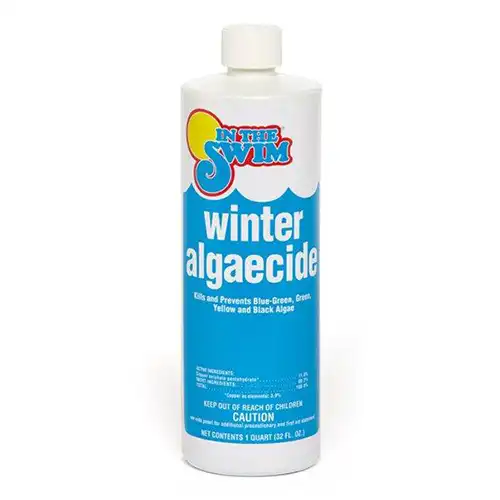
Algaecide 50: A polymer algaecide at 50% strength. Non-staining, long-lasting formula. Good for all types of algae.
Algaecide 60+: A polymer algaecide at 60% strength. Non-staining, long-lasting formula. Good for all types of algae.
Winter Algaecide: A chelated (non-staining) long-lasting copper algaecide with 3% elemental copper. Good for all types of algae.
If you have a well-fitted solid pool cover in great shape, you may be able to get away with using a cheaper or less potent algaecide. On the other hand, if you have a mesh pool cover or one that lets in sunlight and fine debris, a better algaecide is a must.
If you use chlorine shock to close the pool, it's best to do so about a week before closing. A high chlorine level can harm your cover and destroy your algaecide. If you shock with chlorine the day you close the pool, wait about a month before adding the algaecide. Another method is to shock the pool hard when you close, and wait until early spring to add your algaecide (about 8-10 weeks before you open the pool).
If using copper algaecide, it's best not to overdose, especially with a plaster pool. Even though these copper algaecides are chelated, there is still a potential for copper staining if your water isn't properly balanced. The staining potential is much less for vinyl liner pools. We recommend adding a stain preventative if you use copper algaecides, summer or winter.
Winterizing Pool Shock
Pool shock is a key player in the pool closing chemical team. Shocking your pool before closing is necessary to kill any contaminants in the water. Let's face it, many people tend to drop their guard on pool maintenance in the last few weeks of the season. So it's a great idea to shock the pool before closing it for the winter to ensure it stays clean during the winter months.
Before you shock the pool, clean it thoroughly. This is important so the pool shock isn't wasted attacking leaves and other organic debris in the water. Also check the water is balanced, paying special attention to the pH and Total Alkalinity levels — high pH renders pool shock ineffective. Drop the pH level to the lower side of the scale, around 7.2, and check that Total Alkalinity is between 80–120 ppm for best results.
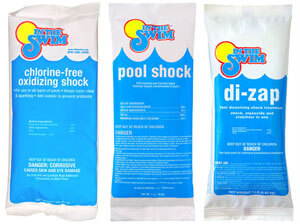
For vinyl pools, non-chlorine pool shock is preferred during winterization. It's clean burning (leaves behind no residue), and it won't harm your vinyl liner. Even for plaster pools, chlorine shock can be harsh for the pool finish. Non-chlorine shock is most often recommended for pool closing because it won't disrupt or destroy other winter pool chemicals that are usually added at the same time.
Dichlor shock is often used for opening pools or during the summer, because it is stabilized against the sun. But there is no need to use this more expensive shock if adding it just before closing the pool. That is, unless your mesh safety cover lets in a lot of sunlight. Regular Pool Magic Spring & Fall or non-chlorine pool shock is usually the best choice as a winterizing pool shock.
Follow the label instructions to add the proper dosage. If you have visible algae, double the dose, and then brush the pool. As mentioned above, it's best to shock the pool several days in advance of closing, so the shock won't attack your algaecide or your pool cover.
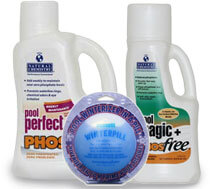
Enzymes for Winter
If you have a mesh safety cover, all sorts of pollutants can wash into the pool throughout the winter. Pool enzymes seek out and consume oils and bacteria that can stain your pool walls and steps. And because they consume these contaminants, it frees up your winter pool chemicals to fight algae.
In the ultimate winter closing kit, we include a bottle of Pool Magic. You could also use Pool Perfect. These both contain PHOSfree to remove phosphates in the pool. Another popular enzyme chemical for pools is the WinterPill. Poke a small pinhole in the pill, drop it in the pool, and it slowly releases the chemical throughout the winter.
Stain & Scale Chemicals
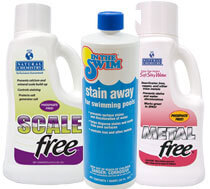
It's always a good idea to use a stain and scale preventative when closing your pool. These chemicals prevent mineral and metal staining. Add them to the pool before disconnecting the filter pump and lowering the water level, because it's important to thoroughly distribute the chemical throughout the pool.
Stain Away is a sequestering agent, or chelator, that keeps minerals and metals tied up in solution and keeps them from staining your pool over the winter. For pools on well water with high levels of iron, magnesium or copper, use Natural Chemistry's Metal Free, which keeps minerals in solution without adding any phosphates to the pool. If you use well water, this product is a must to avoid stains on pool surfaces.
For hard water areas, or for those with high calcium hardness over 400 ppm, Natural Chemistry has another product called Scale Free, which prevents scale buildup. It's also good to use in salt water pools, to keep sodium in solution and prevent it from mixing with organic matter, which can make a pool look dull and dirty.
And there you have it! Now you should understand the ins and outs of pool closing chemicals, and how to maintain your pool in the winter. As for how much you need, our Pool Closing Kits are packaged according to pool size to make it easier. However, your pool may need more or less. It depends on how tightly your pool cover fits, and how much sun and dirt it blocks from entering the water. It also depends on the length of your off-season and how clean the water is when you close.